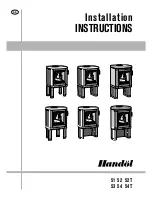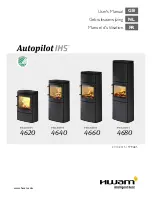
INSTALLATION
PAGE 10
DRAFT REQUIREMENTS
The appliance is merely one component of a larger sys-
tem. The other equally important component is the vent-
ing system which is necessary for achieving the re-
quired flow of combustion air to the fire chamber and for
safely removing unwanted combustion byproducts from
the appliance. If the venting system's design does not
promote these ends, the system may not function prop-
erly. Poorly functioning venting systems may create
performance problems (i.e. smoking stove, poor heat
output, fire goes out, window blackens, increased creo-
sote buildup, etc.) as well as be a safety hazard. Some
factors that may lead to performance problems are as
follows:
•
Oversized or undersized chimney.
•
Excessive offsets in venting.
•
Insufficient vertical height of chimney.
•
Insufficient chimney termination height in relation-
ship to roof.
•
Insufficient ventilation.
•
Lack of maintenance.
•
Improper operation.
•
Burning improper fuel (unit is approved for use with
natural dry well-seasoned wood only).
•
Down drafts in the chimney (may need a special wind
cap).
To ensure that the venting system is functioning prop-
erly a draft test should be performed (see
Draft Test
Procedure
on this page).
American National Standards Institute ANSI/NFPA 211-
92: A chimney or vent shall be so designed and con-
structed to develop a flow sufficient to completely re-
move all flue and vent gases to the outside atmosphere.
The venting system shall satisfy the draft requirements
of the connected appliance in accordance with the
manufacturer instructions.
DRAFT TEST PROCEDURE
After this appliance is installed a draft test should be
performed to ensure proper draft. A qualified technician
should perform the draft test procedure as follows:
1) Close all windows and doors in the dwelling.
2) Turn on or operate all appliances which remove air
from the home (such as a furnace, heat pump, air
conditioner, clothes dryer, exhaust fans, fireplaces,
and other fuel burning appliances).
3) Drill a hole in the vent pipe per the draft gauge
manufacturers instructions (to create a draft test
port). Note: Hole location should be a minimum of 1
foot above flue outlet collar.
4) Start a fire (See
How To Start And Maintain A Fire
on page 16).
5) After the fire is well established (20-25 minutes)
and burning at a low setting, perform the draft test
per the gauge manufacturer instructions. The draft
gauge should read between .05 and .07” W.C. (inches
water column). Excessive draft (above .07 W.C.I.) can
result in too much combustion air to be pulled into the
firebox, this will produce hotter burns and could result in
overfiring. Too little draft (below .05” W.C.) will not allow
enough combustion air delivery to maintain a fire well or
cause performance problems such as smoking (this
may result in improper operation of appliance, i.e. will
not maintain fire well unless fuel door is left open).
6) Install a screw to seal the draft test port in the vent pipe.
If the draft test reading was not within the required
range, correct the installation and repeat this proce-
dure.
VENTILATION REQUIREMENTS / PROVIDE ADE-
QUATE AIR FOR COMBUSTION
THE FRESH AIR REQUIREMENTS OF THIS APPLI-
ANCE MUST BE MET WITHIN THE SPACE WHERE
IT WILL BE INSTALLED. VENTILATION IS ESSEN-
TIAL WHEN USING A SOLID FUEL BURNING
HEATER.
In well insulated and weather tight homes, it may be
difficult to establish a good draft up the chimney
(caused by a shortage of air in the home). The lack of
air is caused by many common household appliances
which exhaust air from the home (such as a furnace,
heat pump, air conditioner, clothes dryer, exhaust fans,
fireplaces, and other fuel burning appliances). Also, the
combustion process of this heater uses oxygen from
inside the dwelling. If the available fresh air delivery in
the dwelling is insufficient to support the demands of
these appliances, problems can result (i.e. excessive
negative pressure can develop in the dwelling which will
affect the rate at which this appliance can draft thus
resulting in performance problems; See
Draft Require-
ments
on this page). To correct this problem it may help
to open a window (preferably on the windward side of
the house) or install a vent to provide make-up air into
the dwelling.
Summary of Contents for EARTHSTOVE 1400HT
Page 23: ...SAFETY LISTING LABEL PAGE 23 ...
Page 24: ...EPA LABEL PAGE 24 ...











































